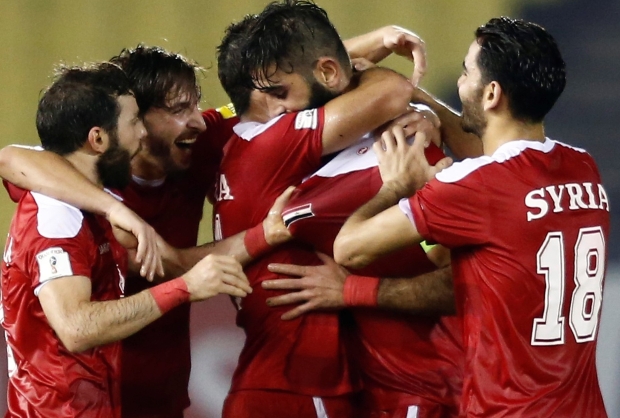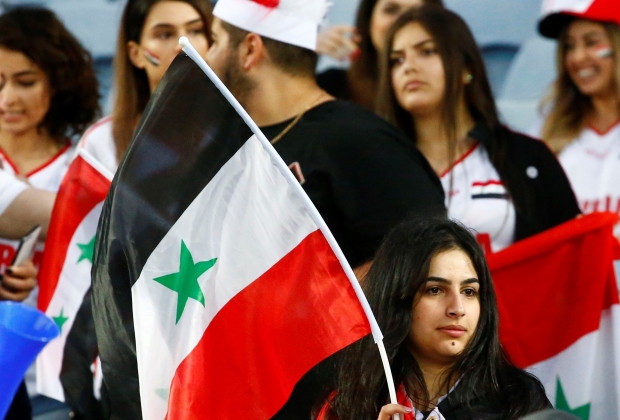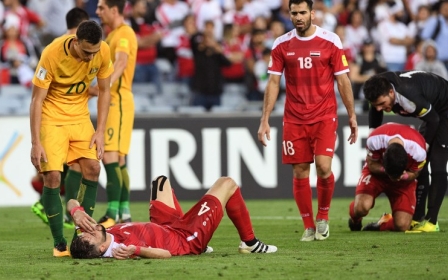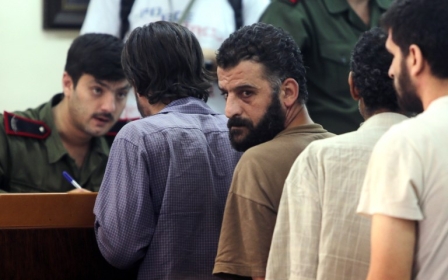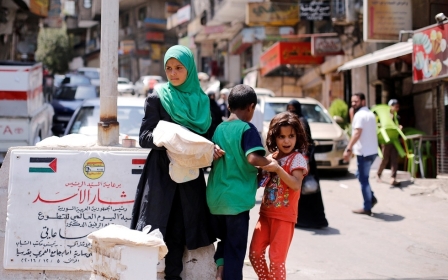Syria's World Cup story: Brutal politics behind the beautiful game
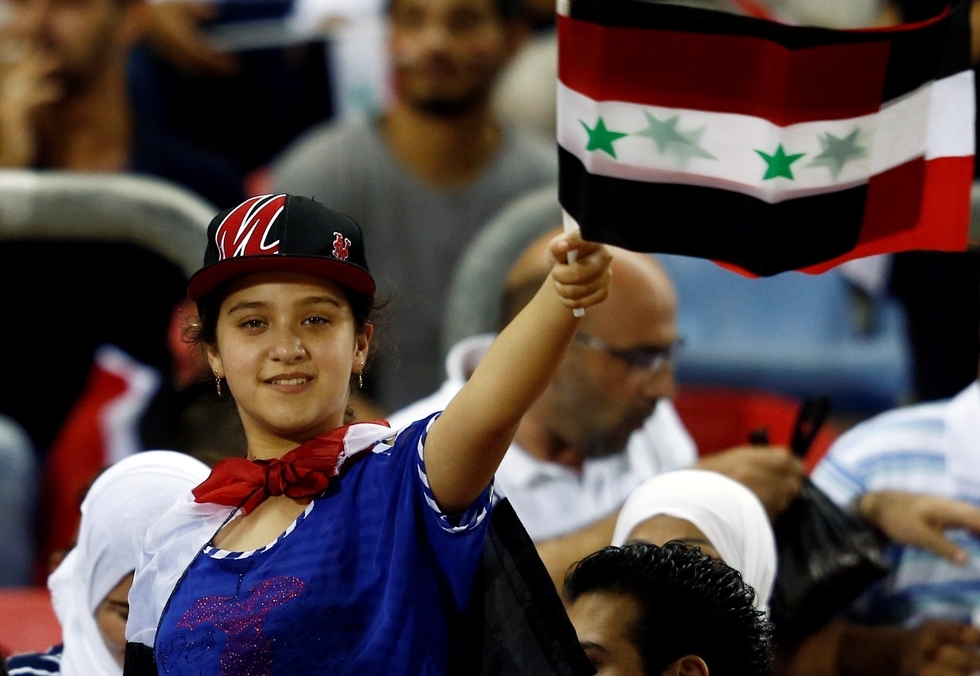
In the end, the distance between Syria and the final chapter of their incredible 2018 World Cup qualification campaign was the width of a post. After 120 gruelling minutes of their play off match against Australia in Sydney, the hosts were going through by a narrow one goal margin, ending a Cinderella story that had captivated many across the world.
Here was a national football team from a country ravaged by a civil war that had displaced more than five million of its citizens. Close to half a million have been killed. Dozens of players had been amongst the dead or injured, as many as 100 according to some.
Others had been arrested, tortured, disappeared. A few had been rehabilitated. Some players, like the under-17 captain Mohammed Jaddou, had fled the violence on the boats run by people smugglers dangerously ferrying families to mainland Europe, depriving Syrian football of its future.
Dramatic goals
Overall, Syria had played 20 games on the road. The first round of qualifications could not be played in Damascus for obvious reasons. Oman - which has cleverly positioned itself as an economic and political intermediary between Iran and the Arab world - stepped in to host them. When no other Arab nation would help for the second round, Malaysia became Syria's temporary home.
Yet the team kept winning, thanks largely to dramatic last-minute goals. In the previous match against Australia in Kuala Lumpur, striker Omar al-Soma had scored an equalising penalty. He had scored earlier in this match too. And now, in the 120th minute he had a free kick on the edge of Australia's penalty box.
Score, and Syria's dream would continue.
In the Middle East football has long been both a chance to rally around the flag and a distraction from the appalling grind of daily life
The world inhaled as he stepped up to the free kick. The ball beat Australia's goalkeeper, Matthew Ryan, but couldn't beat the post. It clattered the upright with a loud ping. It was virtually the last kick of the game. Syria's World Cup journey was over.
As incredible as their journey had been – and no one should underestimate how hard a task it is to progress in Asian World Cup qualification in any normal year, let alone in exile and with a war raging back home – the story was far more complex than a team coming together and offering unity and diversion for its people.
It certainly was not the black and white underdog story that's been written about Iraq's run at the 2004 Olympics, or the Lions of Mesopotamia's incredible 2007 Asian Cup win. As ever, politics bled into football. And, as ever, a government could not help itself from seeking the reflected glory of its national team players.
Propaganda power of football
Governments seeking the propaganda power of football is not new. The Argentina junta invested money and political capital – as well as alleged bribes and coercion – to ensure that it hosted and won the 1978 World Cup. In the Middle East football has long been both a chance to rally around the flag and a distraction from the appalling grind of daily life.
Egypt's Hosni Mubarak was a master of this, mobilising the country and media behind the Pharaohs during the successful 1989 campaign to reach Italia '90. The final game which clinched qualification, against Algeria, was dubbed "The Battle of Cairo" after riots in the stands and on the pitch.
The Egyptian team doctor lost an eye in the confrontation, which was blamed on Algerian legend Lakhdar Belloumi, who for years had an international arrest warrant hanging over him due to the incident. He always denied he was responsible.
In the Gulf, especially in Saudi Arabia and the UAE, princes patronise the game, which offers a release valve for its youth
Twenty years later, Mubarak was at it again. Algeria visited Cairo again for a must-win game, although Belloumi's arrest warrant was dropped. In the week before the Egyptian media depicted the match as a war. The Algerian team bus was attacked as they arrived, injuring several players. Despite the Egyptian media claiming it was a hoax, the whole thing was filmed by French channel Canal+.
Mubarak and his two sons – then being positioned as heirs – visited the team before the game. A 96th minute Egyptian goal sparked pandemonium in the Cairo International Stadium, and riots outside. Algerian fans were attacked. And a sudden-death play off had to be played in neutral Sudan.
Alaa Mubarak, the president's eldest son, was dispatched to the game in Khartoum but Algeria stunned the Egyptians, more riots followed and Alaa gave an interview to Egyptian TV whilst in Sudan, trying to escape and obviously terrified. Of course, over a year later all three men were in jail after the Arab Spring.
General Abdel Fattah el-Sisi, of course, completed a circle when he visited the Egyptian national team after their historic qualification for Russia 2018.
A useful tool for dictators
All governments in the Middle East have tried to co-opt football for various reasons, but the building block is always the same. In Palestine, the national football team is of huge importance in Ramallah and Gaza City. It enjoys support at the highest level. Jibril Rajoub, one of the highest ranking members of Fatah and a potential successor to Mahmoud Abbas, is the president of the Football Association.
The national team is a rare entity that flies the Palestinian flag in the international arena.
In Iraq, the national team is a genuinely popular and very rare symbol of unity. The team comprises of Shia, Sunni and Kurdish players. In the Gulf, especially in Saudi Arabia and the UAE, princes patronise the game, which offers a release valve for its youth.
There is no doubt that the outpouring of love for the Syrian team in both government and rebel held areas is real
In Libya, the national team was always Gaddafi's team. Although it was well known he disliked the game, his sons ran the FA and controlled it. It was one of the reasons why Saadi Gaddafi, a cripplingly average player, somehow managed to play for the national team and Perugia in Italy's Serie A before being banned for taking performance enhancing drugs.
When the Arab Spring reached Libya, the national team was expected to show its fealty to the leader on the African stage. Which many did, until the war consumed the whole country and Gaddafi fled Tripoli. The players that had supported him fled the team too.
Unity, strength, diversion
Sport in general and football in particular is a way to excite patriotism and, in some cases, nationalism, a useful tool for any dictator. In the first few months of the war, perhaps understandably, the Syrian regime wasn't that interested in football. In fact, it had been a propaganda disaster.
When the under 23 team came close to qualifying for the 2012 Olympics, few wanted to talk about the players who were there, but rather one who wasn't.
Jihad Qassab, the former captain of the national team, was allegedly tortured to death in 2016
The team's goalkeeper had been Abdulbaset al-Sarout, the so-called "singing goalkeeper of Homs". He'd left the team and become a symbol of the revolution, surviving several assassination attempts.
Ultimately, Syria missed out on London 2012 and things got worse when the head of Syria's National Olympic Committee – Brigadier General Mowaffak Joumaa – was banned from attending because of his closeness to Assad's regime.
Government threats
As qualification for Russia 2018 began, Syria's best players chose not to play for a team that represented what they saw as an illegitimate regime.
Firas al-Khatib, who for many is Syria's greatest ever player, was the most high profile who refused to play. Omar al-Soma had been absent from the team since 2012 as well. National team goalkeeper Mosab Balhous was jailed early in the conflict for allegedly helping to shelter rebels. Former players were not immune.
Jihad Qassab, the former captain of the national team, was allegedly tortured to death in 2016.
But as the campaign wore on, and Syria's success was becoming well known, the regime capitalised. During the press conference before one qualification game, coach Fajr Ibrahim and Osama Omari wore white t-shirts with pictures of Assad on the front. "He is our president, this is ours," said Ibrahim. Even the younger age groups had become useful. Despite the war, Syria's youth teams had thrived.
They qualified for several regional tournaments, reaching the quarter-finals of all but one in the under-16, -19 and -23 categories. Mohammed Jaddou, the captain if the Under 17 team who fled by boat to Italy and then to Germany, had been part of the team that qualified for the U17 World Cup in Chile in 2015.
The team's success presented a moral dilemma. Do you stay on the outside? Or help, knowing that the team can do some good for your countrymen and women?
He supported the national team, even abroad, but playing for Syria made him a target for both the rebels and the government. "The government used to threaten to end my career and punish me if I didn’t show up for a training camp," he told me in 2015. “They also threatened to call me a deserter if I ever left the team.”
As Syrian government forces have, with Russian help, re-asserted control over large parts of the country, many players and former players have been faced with a difficult decision about their future and many have returned. Mosab Balhous was later released from prison and, amazingly, allowed to rejoin the national team.
He even shook President Bashar al- Assad’s hand when the team was invited to the presidential palace after Syria won the 2012 West Asian Championship, their first ever piece of silverware. Balhous was, briefly, captain and played in Syria’s 6-0 demolition of Afghanistan in their opening qualifier for the 2018 World Cup. He later retired and is now coaching in Oman.
A moral dilemma
But the most striking return was that of Firas al-Khatib and Omar al-Soma, two men whose performances took Syria to another level. Al-Khatib has, understandably, been reluctant to talk about why he returned, but expressed a disillusionment with all sides in the conflict. "Whatever happens, 12 million Syrians will love me," he famously told ESPN. "Twelve million will want to kill me."
The team's success presented a moral dilemma. Do you stay on the outside? Or help, knowing that the team can do some good for your countrymen and women?
And that's before you consider what's under the surface. Several players of the Eritrean national team, for example, told me they feared speaking about the government even after they had fled, for fear that their families would be targeted.
There is no doubt that the outpouring of love for the Syrian team in both government and rebel held areas is real. As is the support from some in the refugee community, who would perhaps have the greatest reason to be suspicious. Some, though, remain less than happy.
The hash tag "Barrel Bomb Team" was trending after the Australia game. But there is no doubt that this was a publicity coup for Assad too. As well-known pro-opposition journalist and activist Oz Katerji tweeted: "Do not frame this as an 'against-all-odds' triumph, the road to Sydney has been paved with too much blood to ignore."
What comes next will define whether Syria can repeat this incredible feat on the pitch. Many of Syria's youth players have already fled the country, and will the players who had reversed their decision to play, like al-Khatib, continue to be rehabilitated like Mosab Balhous? Syria's future, both on and off the pitch, is as complicated as its present.
- James Montague has reported on sport, politics and culture from more than 50 countries for The New York Times, CNN.com, GQ, World Soccer, The Blizzard, The Guardian, New Statesman, Esquire and The Bleacher Report among many others. His radio reports can also be heard regularly on the BBC World Service’s World Football show. He has published three books and is a founding editor of Delayed Gratification, the world’s first slow journalism publication.
The views expressed in this article belong to the author and do not necessarily reflect the editorial policy of Middle East Eye.
Photo: Syrian fans show their support (Reuters)
This article is available in French on Middle East Eye French edition.
New MEE newsletter: Jerusalem Dispatch
Sign up to get the latest insights and analysis on Israel-Palestine, alongside Turkey Unpacked and other MEE newsletters
Middle East Eye delivers independent and unrivalled coverage and analysis of the Middle East, North Africa and beyond. To learn more about republishing this content and the associated fees, please fill out this form. More about MEE can be found here.



